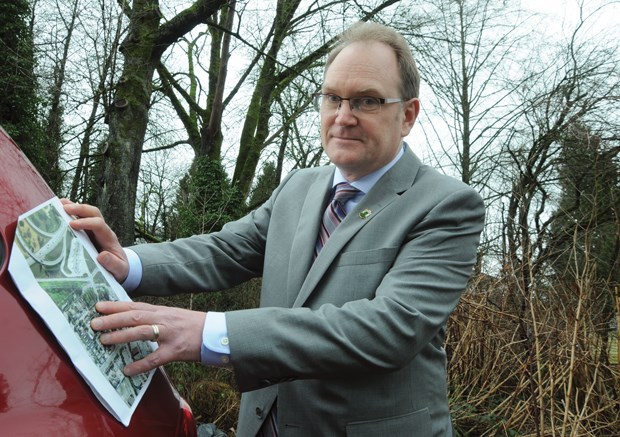The District of North Vancouver is putting its money where its mouth is when it comes to affordable housing – or more precisely, putting its land where its mouth is.
District council voted in favour of a motion from Coun. Jim Hanson Monday night asking staff to draw up a list of district-owned land that may be suitable non-market housing and to identify possible partnerships with private, non-profit and senior government sources to build non-market housing on the land.
“In short, I’m seeking to tease out of this council majority support for us to stand up, offer ourselves to be counted and indicate that we are prepared to do what it takes to be part of the solution to an emerging crisis of housing affordability in North Vancouver district for working families, seniors and others who are being pushed out by the market,” Hanson said.
Hanson’s motion was inspired by the plight of Mountain Court residents. The 75 families in the aged but affordable Lynn Valley complex will be evicted to make way for redevelopment in June.
But, while the motion found unanimous support when it came time for votes, it also triggered a debate happening in councils around the Lower Mainland. Housing is a federal and provincial responsibility and municipalities have limited means to raise money to provide the services expected of them, Coun. Robin Hicks said.
Before going ahead with any projects on district land, Hicks said he’d want to see a full accounting of what the foregone revenue from the land would be as well as clear and identifiable support from the public.
“I’m not saying we shouldn’t do it but I’m saying we should go into it with our eyes open,” Hicks said.
Coun. Roger Bassam put it even more starkly.
“We simply, as a municipality, cannot afford to address the housing continuum and all the needs that exist in our community. We don’t have the resources. It will require senior governments, both the federal and provincial, to step in and fulfil their mandates around housing. To be clear, the municipal government is not responsible for providing housing,” he said.
And Bassam added, the district should only be developing lands in accordance with its official community plan, which emphasizes that density should be concentrated in the four town centres: Lynn Valley, Lions Gate, Lynn Creek and Maplewood.
“The district owns a lot of land but we don’t own a lot of land in our town centres,” he said.
The motion comes on the eve of an event aimed at urging the North Shore municipalities to make concrete commitments for action on the housing crisis.
Metro Vancouver Alliance, a non-partisan group that represents people with myriad religious, cultural and socioeconomic backgrounds, is hosting an affordable housing assembly on Monday at St. Catherine’s Anglican Church in Edgemont Village at 1 p.m.
A strong impetus for the public meeting, according to MVA’s lead organizer Deborah Littman, was West Vancouver’s willingness to look at some solutions involving non-market affordable housing using land owned by the district. West Vancouver recently purchased a piece of land adjacent to the West Vancouver Community Centre from Vancouver Coastal Health. While no decisions have been made, stressed acting mayor Craig Cameron, West Vancouver council is eyeing at least part of it for affordable housing.
“…Because it’s a good place for housing. It’s so central, so close to transit, close to services, shops and we have demonstrable need,” Cameron said. “We need more housing for elderly people. We need more housing for families who have limited incomes and we need housing for disabled people.”
The City of North Vancouver has been building up its supply of below-market housing in exchange for extra density in new condominium projects. That’s something West Vancouver is also looking into, Cameron said.
On Monday, the Globe and Mail reported the City of Vancouver was putting up 20 properties worth $250 million in hopes the new federal government would invest in affordable housing.
Children are encouraged to attend the affordable housing event on Family Day, which will feature three speakers – a student, a senior and a single mother – who will give personal testimony of how the North Shore’s affordable housing crisis has impacted them.
–with files from Maria Spitale-Leisk



